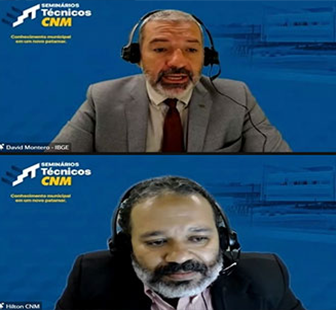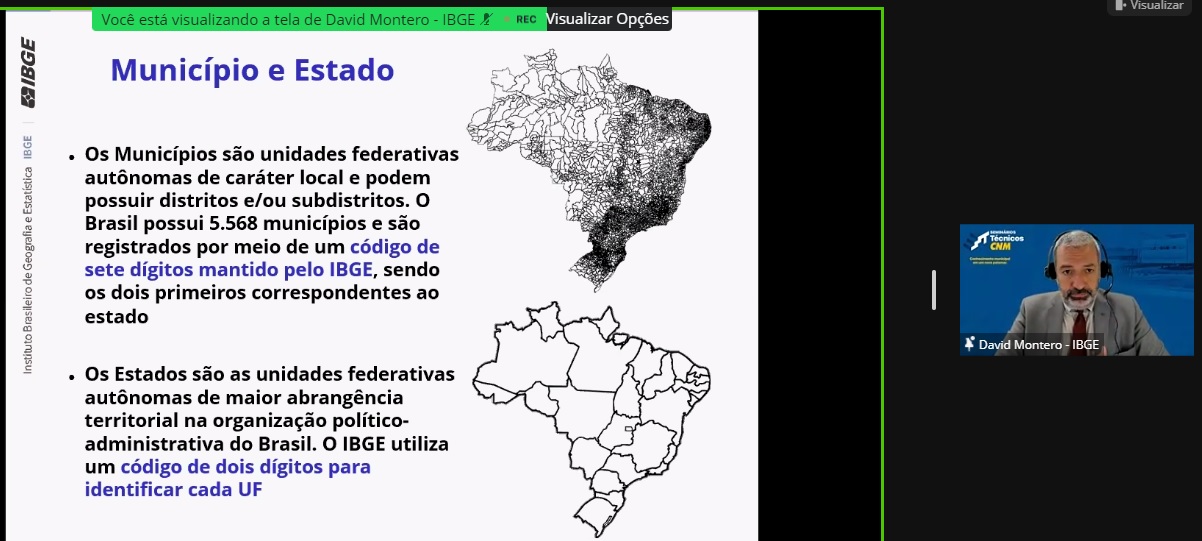CNM fosters seminars highlighting 2022 Census
February 18, 2022 17h48 | Last Updated: March 07, 2022 16h32

In ten years, many changes happen in the municipalities: either structure, population or living conditions. The Census is carried out to understand these and other changes that directly influence municipal administrations. To guide municipal managers on this subject, the National Confederation of Municipalities (CNM) promoted on Thursday, February 17, the first edition of the Technical Seminars in 2022.
At that time, CNM´s economist Hilton Silva highlighted that the entity strongly works for the success of the Census. “The Census is the only way to know who we are, not only in the country as a whole, but rather in each locality. Besides counting people, it brings information about the characteristics of families, migration, religion, health, ethnic and racial characteristics, disability, natality, income, labor, living conditions and commuting for study and work. Having collected the data, we can significantly improve some areas like social assistance, health and education,” said him.
The data collected by the Census also interfere in the Municipal Revenue Sharing Fund (FPM), since the coefficient is calculated based on the population. “We cannot plan the future without the X-ray of the moment. This is accomplished by the Census. With a good Census we can help a lot with the data. For this reason, we ask the municipal managers to encourage residents in their cities to receive the enumerators,” reminded him.
According to David Montero, an analyst of the IBGE´s Operational Coordination of the Censuses, the information is collected immediately and the data are updated in real time. “The technology used by the enumerators registers the questionnaire and, as soon as a household is visited, the information is transmitted through the Internet. A yellow pin appears on the map pointing out that that household was either visited or not and what happened. It is a great opportunity for the city administrations to follow up this work, since we can see how many questionnaires were applied in the region and follow up the work of the enumerators,” highlighted him.
Planning meetings
To guide the managers on how to help in the data collection, the IBGE promotes three monitoring meetings in the localities. The first one happens before the application of the questionnaires and aims at discussing the territorial base, an opportunity in which the map of the municipality and intra-municipal divisions made by the IBGE are introduced. The second round happens during the data collection period in order to follow up the data collection. The last one happens after the data collection to wrap it up and make a preliminary dissemination of the data. “Be aware of the IBGE contact, because we formally invite the mayors´ offices. The municipal participation is fundamental,” commented him.
Standard address registers
The IBGE highlights the importance of standard addresses in Brazil to the work of the Census. The National Address File for Statistical Purposes (CNEFE) aims at that. Developed in 2005 based on the systematization of the data collected by the 2000 Population Census, it is a nationwide address repository. The Address File includes information about households and establishments in the entire country. It is completely updated at each Population Census, as well as it is continually updated according to the demand of other surveys.

CNEFE is updated according to monthly routines to meet the IBGE´s sampling surveys, like, for example, the Continuous National Household Sample Survey (Continuous PNAD) and the Consumer Expenditure Survey (POF). Currently it has more than 79 million addresses registered, of which nearly 27% were updated after 2010, which represents more than 21 million addresses, whereas the others come from the records of the 2010 Population Census.
“We need to standardize the address file in the Brazilian city administrations. To do this, we have to have a standardized format to help in the handling of data, to help the enumerators during their work. Based on CNEFE, the IBGE can provide data to help municipal managers to develop public policies,” highlights Montero.
The standardization of the address file also streamlines the interchange and integration of administrative data within the IBGE and among institutions in general. Through partnerships and cooperation agreements, the involved institutions will gain access to the data, allowing them to match their records, like, for example, localities and addresses. The standard also fosters the use of geographic coordinates to improve the localization of addresses beyond the text registry, by means of known nomenclatures. The use of geo-referenced data and geographic information systems allow new analyses and the strengthening of policies of territory management.
“The interchange of information allows the updating of records, allowing not only comparisons, but also potential amendments and incorporation of data from other sources. The standardization of the address file is key to the success of the partnerships. It will provide more consistent data to underpin decision taking and the implementation of public policies more efficiently,” concludes the analyst of the IBGE´s Operational Coordination of the Censuses.
Next edition
The next edition of the Technical Seminars will be next Tuesday, February 22, based on the following subject: The social assistance policy - municipal administration and Brazil aid. Enrollment is open here and are free for municipalities affiliated to the CNM.
From CNM News Agency
